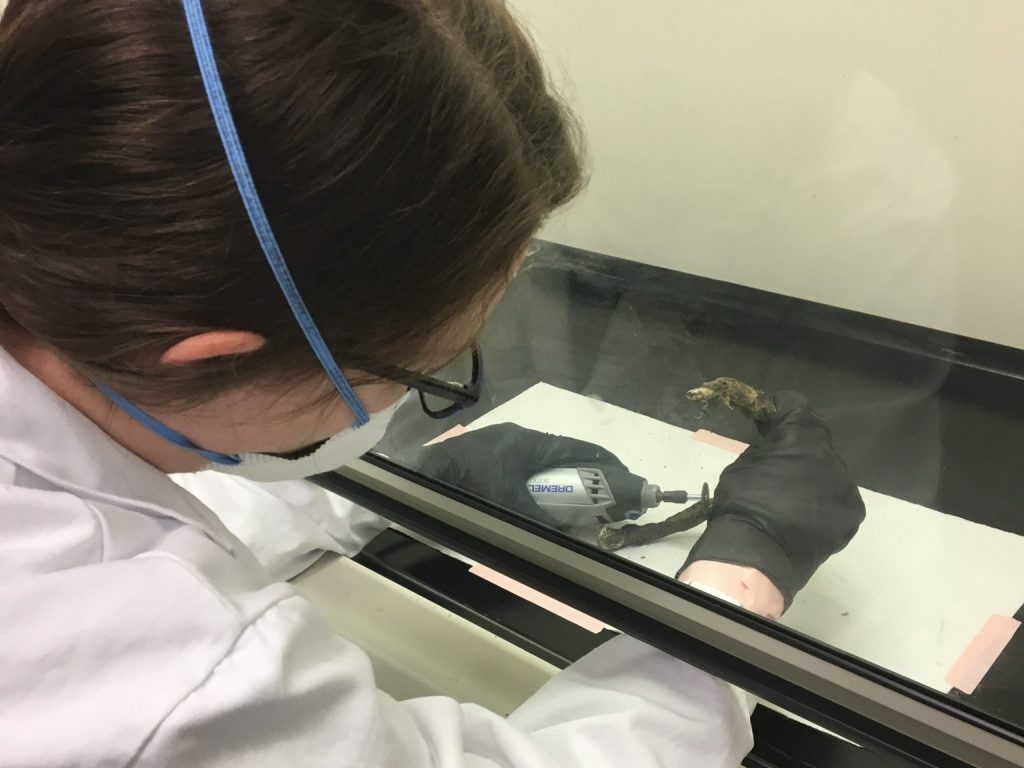
Heather Deel is a member of the Jess Metcalf Lab and joined in 2017. Heather was recently awarded a prestigious National Institutes of Justice Graduate Research in STEM Fellowship to determine how the microbiome changes in bone after death.
Q&A
Tell a bit about your life before you joined CSU
Before joining CSU, I went to Sam Houston State University in a fairly small town called Huntsville, TX. While getting my B.S. in Biology, I also did research at the Southeast Texas Applied Forensic Science facility to study the core microbiome of decomposing remains. In my spare time, I frequently volunteered for the Beta Beta Beta Biological Honor Society, relaxed with friends when time allowed, and visited family on the weekends.
Tell us about your research project and what attracted you to your area of interest
For my research project, my main focus is to build a model for estimating the time since death of human remains. To do this, I am characterizing the internal microbiome of rib samples collected from human subjects over time using high throughput sequencing to create a “microbial stopwatch of death.” The purpose of using rib samples is to estimate time since death on a longer timescale than is currently possible, as the invasion of microbes into bone during decomposition is likely a long process. Then, using machine learning, I plan to build a model that can predict time since death of human remains that have been decomposing for an unknown amount of time.
I was initially attracted to this area of research as an undergraduate student, and during my senior year I had the opportunity to visit CSU to assist on the project described above. After spending a week in Fort Collins and working in what is now my current lab, I decided that CSU was a great choice for a graduate school and that the complexities of microbial decomposition were too interesting to pass up as my research topic!
What do you do to relax when you’re not in the lab?
I absolutely love to travel, and will jump on any opportunity I get to discover someplace new. It is the perfect way for me to clear my mind and unwind. Other times, a nice run is a good way for me to separate myself from work for a bit. When all else fails, my cat (Binx) and dog (Keto) provide some pretty solid entertainment.
What is your favorite thing about the CMB program/CSU/Fort Collins?
My absolute favorite thing about the CMB program is how welcome I felt when I first arrived. Having moved from Texas, I didn’t know anyone when I got to Fort Collins, and CMB did a fantastic job of bringing my cohort together. I also love CSU’s commitment to outreach, which is something I like to dedicate myself to when time allows. Fort Collins is a great city to live in, and I feel like there is an endless number of neat restaurants to try and beautiful mountain trails to discover.
What has surprised you about graduate school?
I don’t think I realized the level of independence I would have as a graduate student, which has worked out well by forcing me to learn how to troubleshoot issues more efficiently. I also was surprised that I don’t do very many wet lab experiments, as most of my work is computational-based.
What has been your biggest challenge so far?
My research as an undergraduate student didn’t require nearly the same amount of time commitment, so juggling a heavy course load and a heavy research load has been a challenge. By far, however, my biggest challenge has been questioning my potential as a good researcher – but through the processing of making mistakes, learning from them, and correcting them, I feel myself improving every day!
What do you plan to do after you graduate?
I’m not entirely sure yet, but I’ve been considering both post-doctoral positions (including international) as well as government or industry positions. I think I am leaning towards a post-doc, but a lot can change before then!
